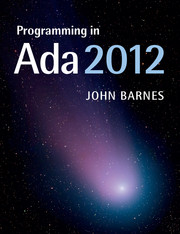Summary
In this chapter we discuss the hierarchical library structure and other mechanisms for separate compilation which were outlined in Chapter 4.
Many languages ignore the simple fact that programs are written in pieces, compiled separately and then joined together. Indeed large programs should be thought of as being composed out of a number of subsystems which themselves have internal structure. There are in fact two distinct requirements.
There is a requirement for decomposing a large coherent program into a number of internal subcomponents. Such a decomposition has particular advantages when a large program is being developed by a team.
There is also a requirement for the creation of a program library where subsystems are written for general use and consequently are written before the programs that use them. Within this structure it is convenient to decompose the interface presented to future clients so that they may select only those parts of a system that are required.
This chapter also contains a further discussion on scope and visibility and summarizes the curious topic of renaming.
Library units
We will start by considering which units of Ada can be compiled separately and the general idea of dependency.
The most common units of compilation are package specifications and bodies and subprograms. Such units may be compiled individually or for convenience several could be submitted to the compiler together. Thus we could compile the specification and body of a package together but, as we shall see, it may be more convenient to compile them individually.
Information
- Type
- Chapter
- Information
- Programming in Ada 2012 , pp. 263 - 296Publisher: Cambridge University PressPrint publication year: 2014
